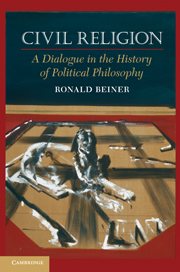Book contents
- Frontmatter
- Contents
- Preface and Acknowledgments
- Introduction
- Part I Machiavelli, Hobbes, Rousseau
- Part II Responses to (and Partial Incorporations of) Civil Religion within the Liberal Tradition
- 9 Baruch Spinoza
- 10 Philosophy and Piety
- 11 Spinoza's Interpretation of the Commonwealth of the Hebrews, and Why Civil Religion Is a Continuing Presence in His Version of Liberalism
- 12 John Locke
- 13 “The Gods of the Philosophers” I
- 14 Bayle's Republic of Atheists
- 15 Montesquieu's Pluralized Civil Religion
- 16 The Straussian Rejection of the Enlightenment as Applied to Bayle and Montesquieu
- 17 “The Gods of the Philosophers” II
- 18 Hume as a Successor to Bayle
- 19 Adam Smith's Sequel to Hume (and Hobbes)
- 20 Christianity as a Civil Religion
- 21 John Stuart Mill's Project to Turn Atheism into a Religion
- 22 Mill's Critics
- 23 John Rawls's Genealogy of Liberalism
- 24 Prosaic Liberalism
- Part III Theocratic Responses to Liberalism
- Part IV Postmodern “Theism”
- Conclusion
- Index
- References
21 - John Stuart Mill's Project to Turn Atheism into a Religion
Published online by Cambridge University Press: 05 June 2012
- Frontmatter
- Contents
- Preface and Acknowledgments
- Introduction
- Part I Machiavelli, Hobbes, Rousseau
- Part II Responses to (and Partial Incorporations of) Civil Religion within the Liberal Tradition
- 9 Baruch Spinoza
- 10 Philosophy and Piety
- 11 Spinoza's Interpretation of the Commonwealth of the Hebrews, and Why Civil Religion Is a Continuing Presence in His Version of Liberalism
- 12 John Locke
- 13 “The Gods of the Philosophers” I
- 14 Bayle's Republic of Atheists
- 15 Montesquieu's Pluralized Civil Religion
- 16 The Straussian Rejection of the Enlightenment as Applied to Bayle and Montesquieu
- 17 “The Gods of the Philosophers” II
- 18 Hume as a Successor to Bayle
- 19 Adam Smith's Sequel to Hume (and Hobbes)
- 20 Christianity as a Civil Religion
- 21 John Stuart Mill's Project to Turn Atheism into a Religion
- 22 Mill's Critics
- 23 John Rawls's Genealogy of Liberalism
- 24 Prosaic Liberalism
- Part III Theocratic Responses to Liberalism
- Part IV Postmodern “Theism”
- Conclusion
- Index
- References
Summary
The kinds of unbelief with which we are most familiar today are respectful indifference and such a nostalgia for lost faith as goes with an inability to distinguish between theological truth and myth. Are not these kinds of unbelief much more insulting to belief than is an unbelief like Machiavelli's which takes seriously the claim to truth of revealed religion by regarding the question of its truth as all-important and therefore is not, at any rate, a lukewarm unbelief?
– Leo StraussIf we secular humanists have our way, the liberal democracies will eventually mutate into societies whose most sacred texts were written by John Stuart Mill.
– Richard RortyIf the purpose of the civil-religion project is to domesticate religion in the light of political requirements, then the liberal tradition as a whole is in some sense closely allied with that project. If the project of domesticating religion per se is what defined civil religion, then one would even be justified in saying that the liberal tradition is coterminous with the civil-religion project. However, in order for the domestication of religion to count as specifically a civil-religion project, it must be animated by the idea of using religion itself to domesticate religion. Somewhat surprisingly, as we have seen in earlier chapters of Part II, there are some liberal political philosophers who cross into civil-religion theorizing in this sense. Reading John Stuart Mill's proposal for a Religion of Humanity in his essay “Utility of Religion,” one is at first tempted to add him to this list of “civil-religion liberals.” On closer examination, though, it becomes clear that his Religion of Humanity is not a civil religion as we have just defined it. Mill wants to give believers something that they can embrace in place of the “old religions” that he is urging them to relinquish, and calling this something a religion should, he thinks, ease the transition to this new more radically humanist dispensation. Whatever existential needs were satisfied by the old religions – for consolation in the face of loss and death, for a sense of absolute foundation for human purposes, for giving support to our intuitions that there is grandeur and meaning to human doings rather than unrelieved insignificance – can therefore continue to be met when those old religions fall into eclipse. Ultimately, though, what he means by a Religion of Humanity is an ungrounded faith in the meaning of human purposes – that is, a faith ungrounded in anything beyond itself – and a “religion” that could achieve this, rather than being in meaningful continuity with the history of religions throughout human experience, would break this continuity and show that human beings had safely arrived at a stage of their development where they could deal with their world without religion.
- Type
- Chapter
- Information
- Civil ReligionA Dialogue in the History of Political Philosophy, pp. 259 - 267Publisher: Cambridge University PressPrint publication year: 2010

